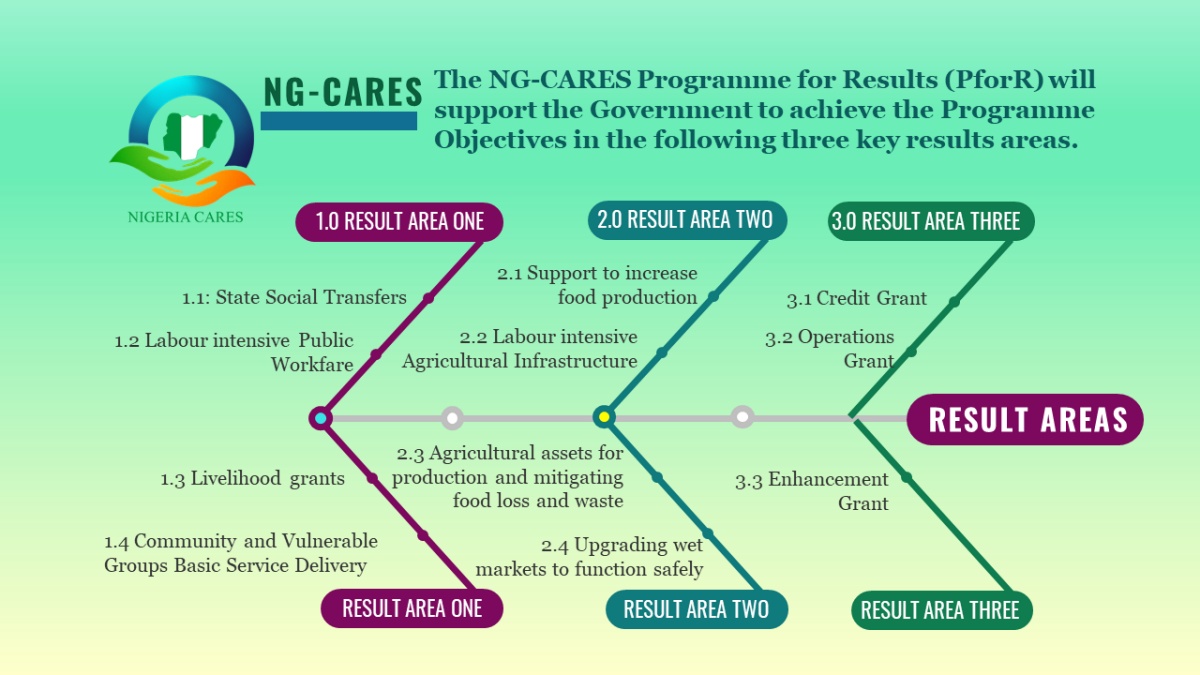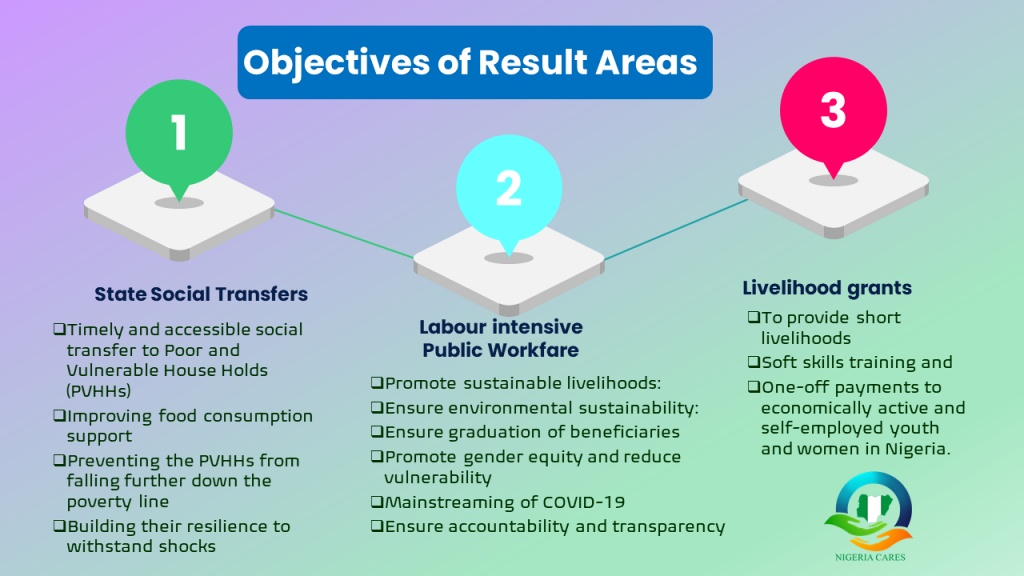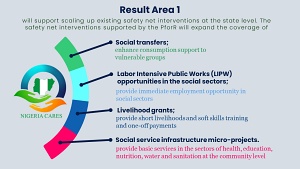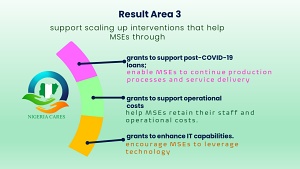NG-CARES Implementing Platforms
The CARES PforR Has Selected Well‐Performing Platforms at the State Level to Support Programs in the Three Results Areas

Community and Social Development Agencies. CSDAs established by law in 31 States of the Federation and FCT, and the Community‐Driven Development Social Project Implementation Units (PIUs) in Delta and Rivers states, are strong and effective platforms to provide pro‐poor service delivery assistance in poor communities across Nigeria since 2008 when the first World Bank assistance on CSDP became effective. The impressive results and impact of the CSDAs on the life and livelihood of the poor in rural communities in Nigeria and the supportive role of the Federal Project Support Unit (FPSU) have been well documented.
 This explains why the state government and the federal government are planning to use the CSDAs and the FPSU as pivotal platforms for the Nigeria CARES, since the agencies are considered as the foremost and effective pro‐poor service delivery mechanism in the country. The project also supported capacity building of over 2,400 officials of LGA and state government sectoral ministries (out of a target of 1,000). The CSDAs rely on experienced and highly professional staff in many of the states. The existing manuals and guidelines of the CSDAs will be strengthened in line with the dictates of the design of the Nigeria CARES.
This explains why the state government and the federal government are planning to use the CSDAs and the FPSU as pivotal platforms for the Nigeria CARES, since the agencies are considered as the foremost and effective pro‐poor service delivery mechanism in the country. The project also supported capacity building of over 2,400 officials of LGA and state government sectoral ministries (out of a target of 1,000). The CSDAs rely on experienced and highly professional staff in many of the states. The existing manuals and guidelines of the CSDAs will be strengthened in line with the dictates of the design of the Nigeria CARES.
FADAMA. The Fadama implementation units at the state and federal levels have successfully implemented a series of World Bank‐financed agricultural projects for nearly three decades. This started with the NFDP (P063622) in 1992, with the objective to develop small‐scale irrigation in 160,000 ha of land—and expanded over time to cover all 36 states and FCT. The implementation modalities evolved over time to improve project performance and effectively meet the needs of target communities.


 For example, while the first project was largely supply driven to develop small‐scale irrigation, the follow‐on second (P073686) and third NFDP (P096572) and the AF projects (P130788 and P158535) adopted the CDD approach to achieve various objectives, including increasing incomes of users of land and water resources, developing agricultural value chains, and restoring livelihoods of conflict‐affected households. The transition to CDD approach enabled better targeting of the poor and most vulnerable farmers using methods that are well understood by the poor. The
For example, while the first project was largely supply driven to develop small‐scale irrigation, the follow‐on second (P073686) and third NFDP (P096572) and the AF projects (P130788 and P158535) adopted the CDD approach to achieve various objectives, including increasing incomes of users of land and water resources, developing agricultural value chains, and restoring livelihoods of conflict‐affected households. The transition to CDD approach enabled better targeting of the poor and most vulnerable farmers using methods that are well understood by the poor. The
achievement of results has been impressive. Institutionally, the state and federal implementation units have over time strengthened their capacity for fiduciary oversight, M&E systems, safeguards management, grievance handling
26 A recent survey carried out by the NBS reported that 85 percent of households experienced increase in price of major food items and more than 50 percent of rural farmers cannot access farm inputs due to disruptions in farm inputs supply chains. These numbers are expected to be higher for small‐scale poor farmers and women farmers because they cultivate smaller pieces of land and buy smaller quantities. mechanisms, and so on. The strong capacity of these units has enabled state governments to use their staff to provide
handholding support to new PIUs across various sectors.
State MSE platforms. Under Results Area 3, states can either leverage the BOI GEEP or states’ own MSE platforms to
support MSEs. The GEEP platform commenced in 2016 and provides loans of between NGN 10,000 (US$28) and NGN
300,000 (US$835) to traders, artisans, enterprising youth, and farmers.
Some states have decided to leverage states’ own MSE platforms that have been existing along with states’ MSE programs.
During the project preparation and pre‐appraisal stage, the World Bank discussed with all the states the minimum criteria
for any platform to be eligible for the program. These include fulfilling the criteria of ‘selectivity’—the ability for the
platform to select and verify eligible beneficiaries, ‘scalability’—the ability for the platform to scale up when needed, and
‘sustainability’—the platform being financially sustainable. Some examples of states’ own platforms include the Kaduna
State Digital Enterprise Platform (KADDEP) and the Abuja Enterprise Agency (AEA).
KADDEP is a digital platform that manages all databases and user engagement integrated from various agencies and
organizations for the program. Similar to the GEEP platform, KADDEP provides various services, including verification,
command center, and field operations, as well as funds disbursement, validations, and accounts management services.
KADDEP has been partnering with BOI GEEP and Sterling Banks’ Specta credit platforms and has disbursed over NGN 66
billion to over 75,000 individuals and business customers in two years. AEA is the FCT vehicle for wealth creation,
employment generation, poverty eradication, and value orientation with a mandate to facilitate business growth in the
FCT. For the implementation of the program, AEA will leverage the customer risk management (CRM) platform as well as
the FCT Microfinance Bank. CRM is a flexible and scalable software platform that conducts automated risk assessment and
credit origination. FCT Microfinance Bank will perform the rest of the functions including funds disbursement, cash‐out,
and management. AEA’s credit facility has extended over NGN 2 billion to 13,000 MSMEs since its launch in 2006.



